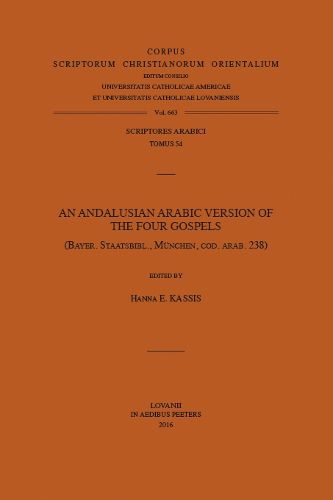Readings Newsletter
Become a Readings Member to make your shopping experience even easier.
Sign in or sign up for free!
You’re not far away from qualifying for FREE standard shipping within Australia
You’ve qualified for FREE standard shipping within Australia
The cart is loading…






Within one year of the conquest of Spania (AD 711), the Muslim
conquerors struck coins, with legends in Latin, demonstrating the tenets
of their faith: ‘In the Name of God; there is no deity other than
God, Alone, without compeer’. This proclamation was followed by a
bilingual mint,drawn from the Qur'an: ‘He is God, Unique, God
Everlasting, He who has not begotten, and who has not been begotten, and
equal to Him is not any one’ (Qur'an 112). Then solely in Arabic,
the coins replaced the legend Spania with al-Andalus.
As the Christian population of Al-Andalus became increasingly
arabicised, the need for translating their sacred scriptures into Arabic
undoubtedly ensued. It is interesting to note that article 26 of the
Fourth Council of Toledo (AD 633) had decreed that when priests were
assigned to their districts (parishes), the bishops were to provide them
each with a copy of the Gospels so that, having mastered the teachings
of the Gospels, the priests would not err in the application of God’s
law and intent. An Arabic translation of the Scriptures - particularly
the Gospels - would meet that requirement and satisfy a growing need of
the priesthood and the faithful laity - non-conversant in Latin - to
read and hear the sacred text in the language that they comprehended
best.
$9.00 standard shipping within Australia
FREE standard shipping within Australia for orders over $100.00
Express & International shipping calculated at checkout
Within one year of the conquest of Spania (AD 711), the Muslim
conquerors struck coins, with legends in Latin, demonstrating the tenets
of their faith: ‘In the Name of God; there is no deity other than
God, Alone, without compeer’. This proclamation was followed by a
bilingual mint,drawn from the Qur'an: ‘He is God, Unique, God
Everlasting, He who has not begotten, and who has not been begotten, and
equal to Him is not any one’ (Qur'an 112). Then solely in Arabic,
the coins replaced the legend Spania with al-Andalus.
As the Christian population of Al-Andalus became increasingly
arabicised, the need for translating their sacred scriptures into Arabic
undoubtedly ensued. It is interesting to note that article 26 of the
Fourth Council of Toledo (AD 633) had decreed that when priests were
assigned to their districts (parishes), the bishops were to provide them
each with a copy of the Gospels so that, having mastered the teachings
of the Gospels, the priests would not err in the application of God’s
law and intent. An Arabic translation of the Scriptures - particularly
the Gospels - would meet that requirement and satisfy a growing need of
the priesthood and the faithful laity - non-conversant in Latin - to
read and hear the sacred text in the language that they comprehended
best.